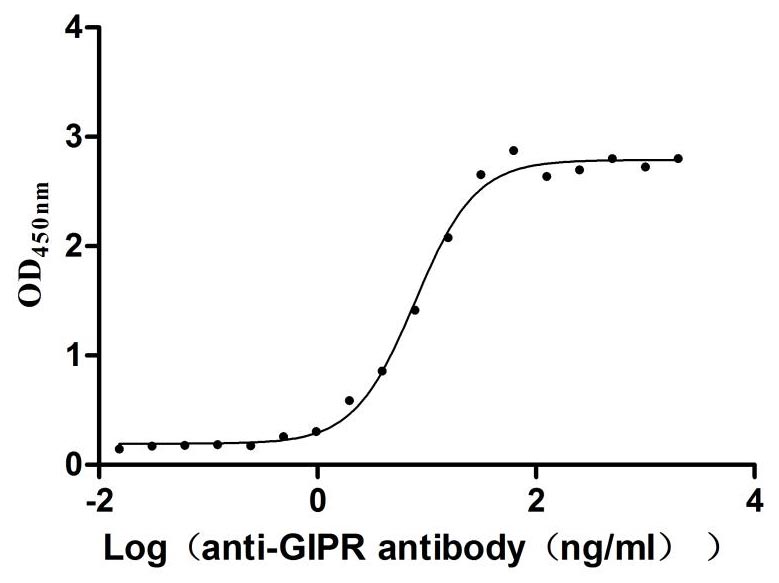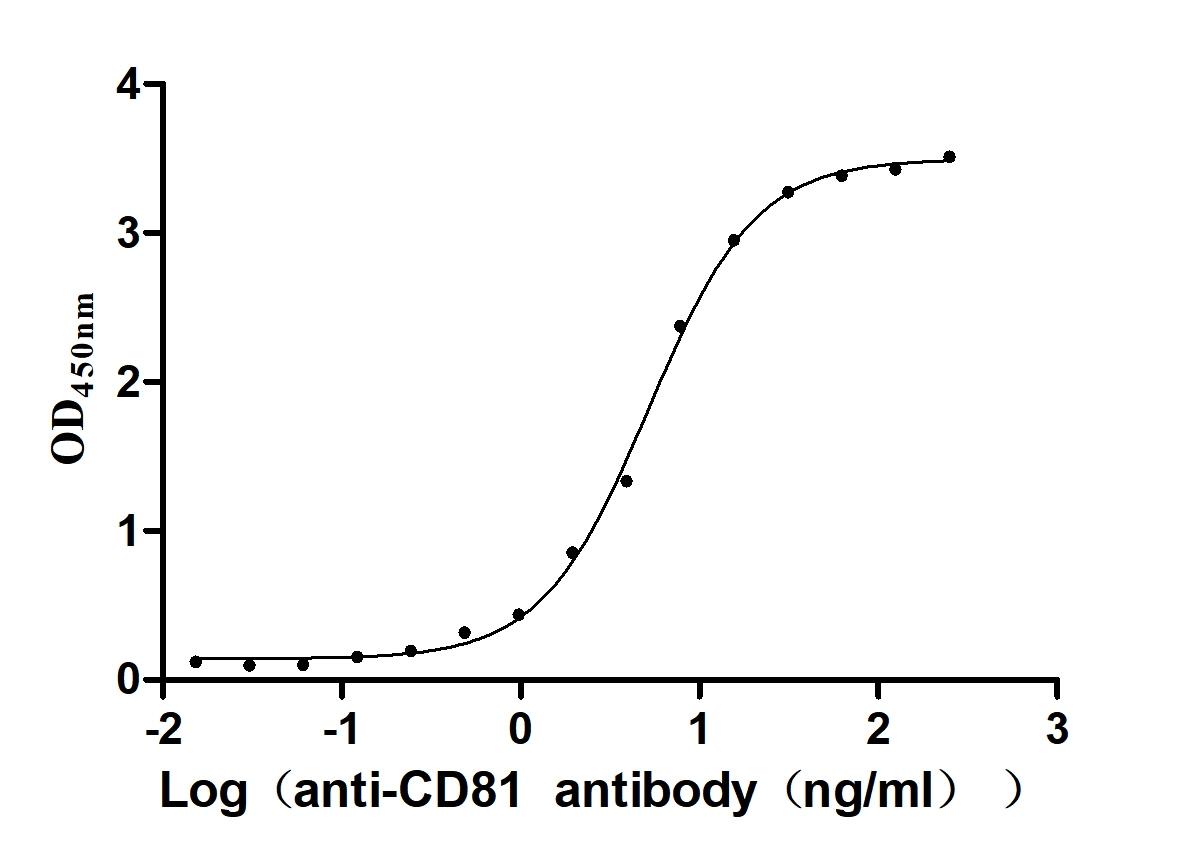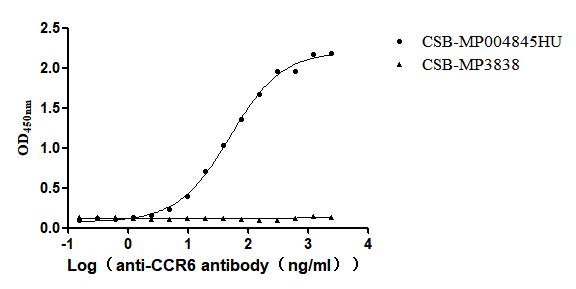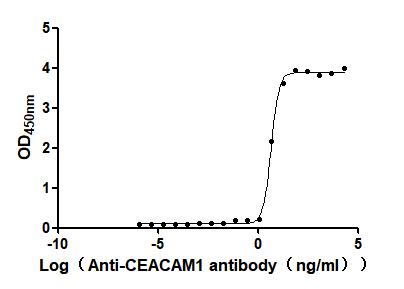Recombinant Human Receptor-type tyrosine-protein phosphatase O (PTPRO), partial
-
货号:CSB-YP623099HU
-
规格:
-
来源:Yeast
-
其他:
-
货号:CSB-EP623099HU
-
规格:
-
来源:E.coli
-
其他:
-
货号:CSB-EP623099HU-B
-
规格:
-
来源:E.coli
-
共轭:Avi-tag Biotinylated
E. coli biotin ligase (BirA) is highly specific in covalently attaching biotin to the 15 amino acid AviTag peptide. This recombinant protein was biotinylated in vivo by AviTag-BirA technology, which method is BriA catalyzes amide linkage between the biotin and the specific lysine of the AviTag.
-
其他:
-
货号:CSB-BP623099HU
-
规格:
-
来源:Baculovirus
-
其他:
-
货号:CSB-MP623099HU
-
规格:
-
来源:Mammalian cell
-
其他:
产品详情
-
纯度:>85% (SDS-PAGE)
-
基因名:PTPRO
-
Uniprot No.:
-
别名:FMI; GLEPP 1; Glomerular epithelial protein 1; hPTP-J; Pancreatic carcinoma phosphatase 2; PCP-2; PCP2; Phosphotyrosine phosphatase U2; Protein tyrosine phosphatase PTP U2; Protein tyrosine phosphatase PTPU2; Protein tyrosine phosphatase receptor type O; Protein tyrosine phosphatase U2; Protein-tyrosine phosphatase J; Protein-tyrosine phosphatase pi; Protein-tyrosine phosphatase receptor omicron; PTP pi; PTP U2; PTP-J; PTP-RO; PTP-U2; PTPase U2; PTPRO; PTPRO_HUMAN; PTPROt; PTPU 2; PTPU2; R-PTP-O; R-PTP-psi; Receptor type protein tyrosine phosphatase O; Receptor type tyrosine protein phosphatase O; Receptor-type protein-tyrosine phosphatase psi; Receptor-type tyrosine-protein phosphatase O; Receptor-type tyrosine-protein phosphatase U
-
种属:Homo sapiens (Human)
-
蛋白长度:Partial
-
蛋白标签:Tag type will be determined during the manufacturing process.
The tag type will be determined during production process. If you have specified tag type, please tell us and we will develop the specified tag preferentially. -
产品提供形式:Lyophilized powder
Note: We will preferentially ship the format that we have in stock, however, if you have any special requirement for the format, please remark your requirement when placing the order, we will prepare according to your demand. -
复溶:We recommend that this vial be briefly centrifuged prior to opening to bring the contents to the bottom. Please reconstitute protein in deionized sterile water to a concentration of 0.1-1.0 mg/mL.We recommend to add 5-50% of glycerol (final concentration) and aliquot for long-term storage at -20℃/-80℃. Our default final concentration of glycerol is 50%. Customers could use it as reference.
-
储存条件:Store at -20°C/-80°C upon receipt, aliquoting is necessary for mutiple use. Avoid repeated freeze-thaw cycles.
-
保质期:The shelf life is related to many factors, storage state, buffer ingredients, storage temperature and the stability of the protein itself.
Generally, the shelf life of liquid form is 6 months at -20°C/-80°C. The shelf life of lyophilized form is 12 months at -20°C/-80°C. -
货期:Delivery time may differ from different purchasing way or location, please kindly consult your local distributors for specific delivery time.Note: All of our proteins are default shipped with normal blue ice packs, if you request to ship with dry ice, please communicate with us in advance and extra fees will be charged.
-
注意事项:Repeated freezing and thawing is not recommended. Store working aliquots at 4°C for up to one week.
-
Datasheet :Please contact us to get it.
相关产品
靶点详情
-
功能:Possesses tyrosine phosphatase activity. Plays a role in regulating the glomerular pressure/filtration rate relationship through an effect on podocyte structure and function.
-
基因功能参考文献:
- the present study demonstrated that PTPRO inhibits tumor growth in vitro and in vivo, indicating the tumor suppressive function of PTPRO in LSCC. This study highlights PTPRO as an epigenetically silenced gene, and a candidate tumor-suppressor of LSCC. PMID: 28586036
- Single nucleotide polymorphism in PTPRO gene is associated with Acute Renal Graft Rejection. PMID: 27272414
- Results provide evidence that PTPRO inhibits ERBB2-driven breast cancer through dephosphorylation leading to dual effects of ERBB2 signaling suppression and endosomal internalization of ERBB2. PMID: 27345410
- PTPRO is a novel candidate gene in emphysema with severe airflow obstruction. PMID: 28199135
- PTPRO truncated serves as an important tumor suppressor in hepatocellular carcinoma microenvironment. PMID: 26117839
- These observations confirm that PTPRO plays a critical role in liver fibrogenesis by affecting PDGF signaling in HSC activation and might be developed into a feasible therapeutic approach for the treatment of chronic fibrotic liver diseases. PMID: 25633279
- The optimal pH value of PTP-oc is approximately 7.0. PMID: 25462809
- Loss of PTPRO expression is associated with chronic lymphocytic leukemia. PMID: 25482129
- Results highlight the PTPRO contribution in negative regulation of SRC/EGFR signaling in colon cancer. PMID: 25301722
- PTPRO was drastically decreased in fulminant hepatitis, and this was associated with enhanced beta-catenin accumulation but reduced IFN-gamma secretion. PMID: 25339662
- Our study suggests an interesting PTPRO/TLR4/NF-kappaB signaling feedback loop in Hhepatocellular carcinomcarcinogenesis and progression PMID: 25034527
- PTPRO level was decreased in the early phase but reversed in the late phase of hepatic ischemia reperfusion injury. PMID: 24128416
- PTPRO methylation is associated with poor survival only in HER2-positive patients. PMID: 24090193
- methylation and downregulation of PTPRO in a subset of primary human HCC and establish VCP as a novel functionally important substrate of this tyrosine phosphatase that could be a potential molecular target for HCC therapy. PMID: 23533167
- ErbB2 is a direct substrate of PTPRO and decreased expression of PTPRO predicts poor prognosis for ErbB2-positive breast cancer patients. PMID: 22851698
- Three intronic SNPs in PTPRO were associated with learning and memory. PMID: 22126837
- hypermethylated PTPRO occurs frequently in esophageal squamous cell carcinoma PMID: 22099875
- These findings further substantiate the role of TCL1 in PTPROt suppression and its importance in the pathogenesis of chronic lymphocytic leukemia. PMID: 22001392
- The present study introduces mutations in PTPRO as another cause of autosomal-recessive nephrotic syndrome. PMID: 21722858
- conclude that an intronic promoter within the protein tyrosine phosphatase, receptor type(GLEPP1) gene drives the expression of the protein tyrosine phosphatase-osteoclast(PTP) in a cell type-specific manner PMID: 12949066
- Growth-suppressor characteristics of PTPRO are unique to a classical tumor suppressor in lung cancer. PMID: 15356345
- overexpression of PTPROt inhibited BCR-triggered SYK tyrosyl phosphorylation, activation of the associated adaptor proteins SHC and BLNK, and downstream signaling events, and inhibition lymphoma cell proliferation and inducion of lymphoma cell apoptosis PMID: 16888096
- PTPRO methylation and silencing has a role in chronic lymphocytic leukemia tumorigenesis PMID: 17545520
- GLEPP1 expression may be a useful marker of podocyte injury in immunoglobulin A nephropathy, and may be predictive of clinical and pathological severity PMID: 17593862
- PTPRO gene is co-regulated by both E2F1 and miR-17-92. PMID: 18644370
- These data suggest that estrogen-mediated suppression of PTPRO is probably one of the early events in estrogen-induced tumorigenesis and that expression of PTPRO could facilitate endocrine therapy of breast cancer. PMID: 19095770
- Dimerization of neuronal type III receptor-protein tyrosine phosphatase PTPRO in living cells is regulated by disulfide linkages in the PTPRO intracellular domain. PMID: 19573017
- BCL6 repressed PTPROt transcription via a direct interaction with functional BCL6 binding sites in the PTPROt promoter PMID: 19855081
显示更多
收起更多
-
相关疾病:Nephrotic syndrome 6 (NPHS6)
-
亚细胞定位:Membrane; Single-pass type I membrane protein.
-
蛋白家族:Protein-tyrosine phosphatase family, Receptor class 3 subfamily
-
组织特异性:Glomerulus of kidney. Also detected in brain, lung and placenta.
-
数据库链接:
HGNC: 9678
OMIM: 600579
KEGG: hsa:5800
STRING: 9606.ENSP00000281171
UniGene: Hs.160871
Most popular with customers
-
Recombinant Human Angiopoietin-2 (ANGPT2) (Active)
Express system: Mammalian cell
Species: Homo sapiens (Human)
-
Recombinant Dog Angiopoietin-2 (ANGPT2) (Active)
Express system: Mammalian cell
Species: Canis lupus familiaris (Dog) (Canis familiaris)
-
Express system: Mammalian cell
Species: Homo sapiens (Human)
-
Recombinant Human Microtubule-associated protein tau (MAPT) (Active)
Express system: Mammalian cell
Species: Homo sapiens (Human)
-
Recombinant Rat Gastric inhibitory polypeptide receptor (Gipr), partial (Active)
Express system: Mammalian cell
Species: Rattus norvegicus (Rat)
-
Recombinant Human CD81 antigen (CD81), partial (Active)
Express system: Mammalian cell
Species: Homo sapiens (Human)
-
Recombinant Human C-C chemokine receptor type 6(CCR6)-VLPs (Active)
Express system: Mammalian cell
Species: Homo sapiens (Human)
-
Express system: Mammalian cell
Species: Homo sapiens (Human)


-AC1.jpg)
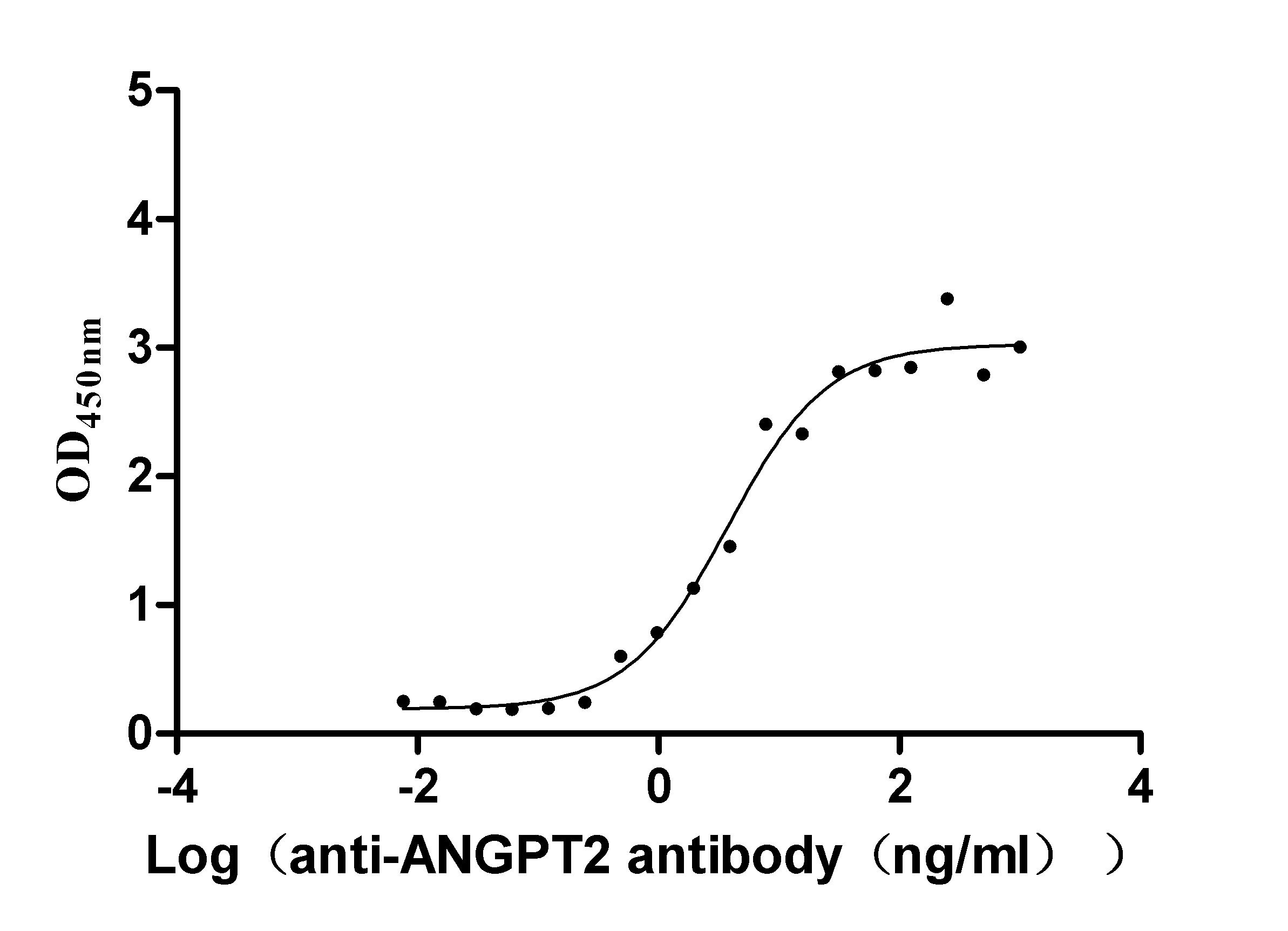
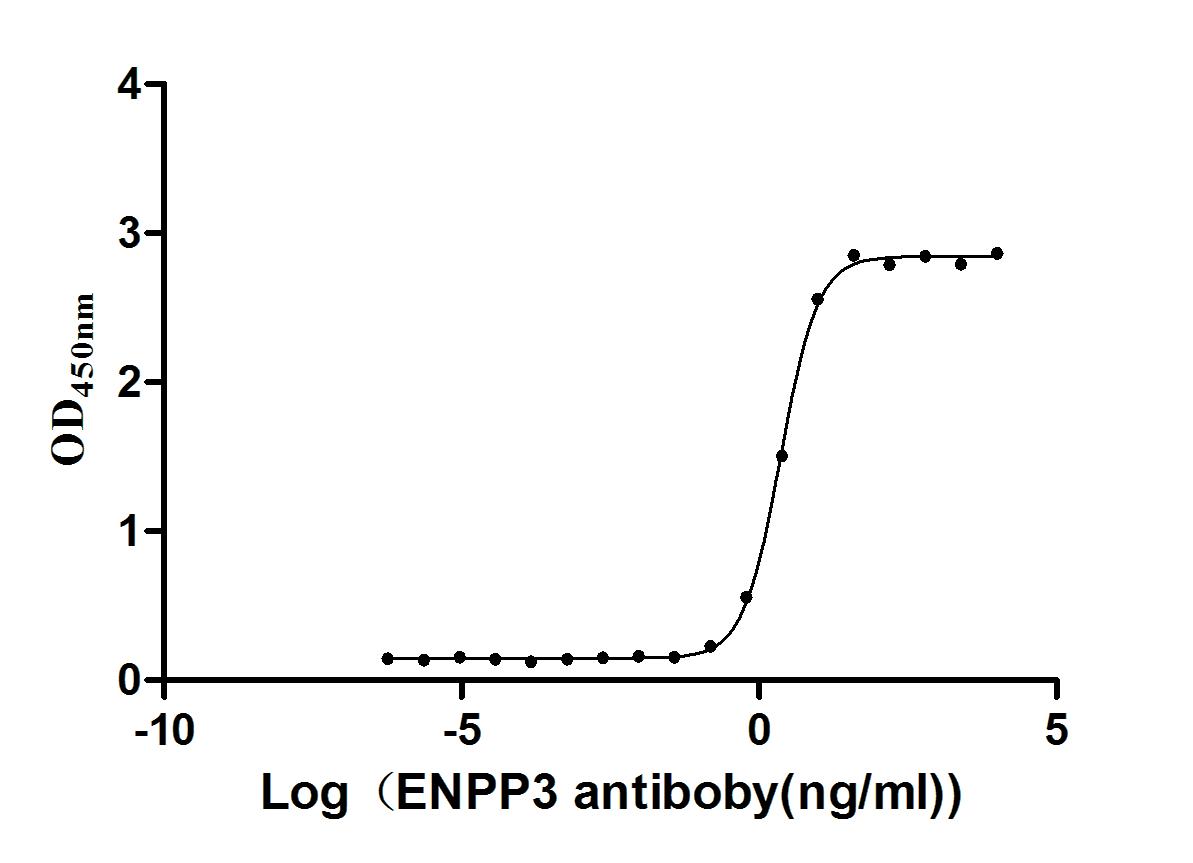
-AC1.jpg)
